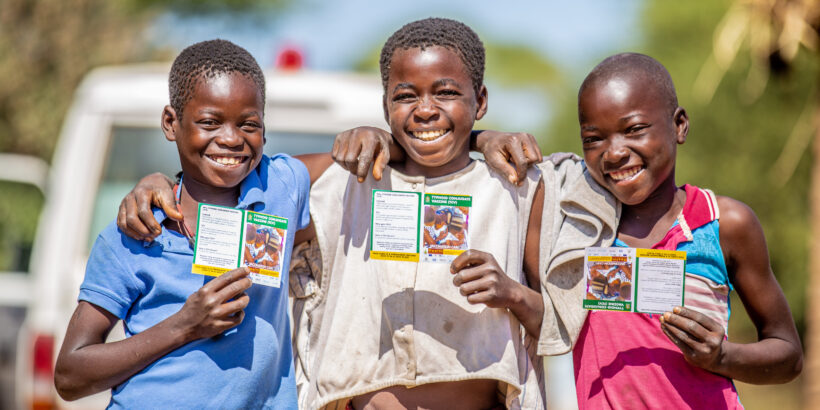Typhoid is spread by infected human waste, so safe food, clean water, improved sanitation, and good hygiene (WASH) practices are key to preventing the disease. Because of the significant burden of typhoid and the growing threat of drug resistance, the role of vaccines alongside WASH interventions is critical in high-risk, typhoid-endemic areas. This is especially important among rural and hard-to-reach communities where progress in medical services, infrastructure, and development may be slow. Additionally, typhoid vaccines are valuable for travelers, food workers (including street vendors), household contacts of typhoid carriers, and laboratory workers.
Currently available typhoid vaccines
Three classes of typhoid vaccines are currently recommended by the World Health Organization (WHO).
| Name | Typhoid conjugate vaccines (TCV) | Ty21a | Vi capsular polysaccharide vaccines (ViCPS) |
| Tradename(s) (Manufacturer) | Typbar TCV® (Bharat Biotech) TYPHIBEV® (Biological E) SKYTyphoid™ (SK bioscience) ZyVac® TCV (Zydus Lifesciences Limited) |
Vivotif® (PaxVax) | Typhim Vi® (Sanofi Pasteur) Typherix® (GlaxoSmithKline) |
| Administration | Intramuscular injection | Oral capsules | Intramuscular injection |
| Age | >6 months of age | >6 years of age | >2 years of age |
| Number of doses | 1 dose | 3 to 4 doses | 1 dose with boosters every 2 to 3 years |
| Duration of protection | > 4 years | 7 years | 2 years |
| Effectiveness | 79% to 85% | 50% to 80% | 50% to 80% |
Typhoid conjugate vaccines (TCVs) preferentially recommended by WHO because of their improved performance, single dose, and suitability for younger children. TCVs provide strong protection for at least 4 years, require only one dose, and are safe and effective for children older than 6 months of age. Four TCVs are WHO prequalified, of which two are available with support from Gavi, the Vaccine Alliance. Many more are under development.
Typbar TCV, manufactured by Bharat Biotech Ltd., was prequalified by WHO in late 2017 and recommended by WHO in 2018. It is administered in a single dose and approved for children six months of age and older. Large Phase 3 efficacy studies conducted in Bangladesh, Malawi, and Nepal showed that Typbar TCV prevented 79-85 percent of typhoid cases in children 9 months to 16 years old. This vaccine can also be safely co-administered with other routine childhood vaccines including measles-rubella, yellow fever, meningococcal A, polio, and human papillomavirus vaccines.
TYPHIBEV, manufactured by Biological E, was prequalified by WHO in late 2020. It is administered in a single dose and approved for children six months of age and older. Clinical studies show that it is safe and has an immune response profile that is similar to Typbar TCV. This vaccine can also be safely co-administered with other routine childhood vaccines including measles-rubella, yellow fever, meningococcal A, polio, and human papillomavirus vaccines.
SKYTyphoid, manufactured by SK bioscience, and ZyVac TCV, manufactured by Zydus Lifesciences Limited, were prequalified by WHO in 2024. Both vaccines are administered as a single dose and approved for children six months of age and older. Clinical studies show that its immune response profile and safety are similar to that of Typbar TCV. Neither SKYTyphoid nor ZyVac TCV are currently available through support from Gavi, the Vaccine Alliance.
Uptake of the Ty21a and ViCPS vaccines in typhoid-endemic countries has been low. The Ty21a vaccine requires numerous doses, and the ViCPS vaccine has short-lived protection. Additionally, neither vaccine can be used in children younger than two years of age, which limits the potential health benefits and prevents use in routine childhood vaccination programs. Gavi does not provide funding for Ty21a or ViCPS vaccines.
World Health Organization recommendations and Gavi support
The WHO position paper on typhoid vaccines, published in 2018, states:
WHO recommends programmatic use of typhoid vaccines for the control of typhoid fever. […] Among the available typhoid vaccines, TCV is preferred at all ages in view of its improved immunological properties, suitability for use in younger children and expected longer duration of protection. Countries may also consider the routine use of ViPS vaccine in individuals aged 2 years and older, and Ty21a vaccine for individuals aged more than 6 years. In choosing a typhoid vaccine, the costs, programmatic issues and duration of protection should be considered.
WHO recommends the introduction of TCV to be prioritized in countries with the highest burden of typhoid disease or a high burden of antimicrobial resistant S. Typhi. Decisions on the age of TCV administration, target population and delivery strategy for routine and catch-up vaccination should be based on the local epidemiology of typhoid fever, including antimicrobial resistance patterns, and programmatic considerations of the routine childhood immunization programme.
Gavi has provided financial support for eligible countries to introduce TCVs since 2018.
Outbreak response and country introductions
Several countries have already introduced TCV into their routine immunization programs including Bangladesh, Burkina Faso, Kenya, Liberia, Malawi, Nepal, Niger, Pakistan, Samoa, Tuvalu, and Zimbabwe. TCV has been used safely and effectively as part of outbreak response efforts, both in Pakistan to control an extensively drug-resistant typhoid outbreak that began in 2016 and in Zimbabwe. Following Pakistan’s outbreak response TCV campaign, they became the first country to introduce TCVs into their routine childhood immunization program with the launch of a phased introduction beginning in Sindh Province in November 2019, followed by Punjab Province and Islamabad in 2021 and the remaining provinces in 2022.
Liberia was the first African country to introduce TCV into its national routine immunization schedule in April 2021, followed by Zimbabwe in May 2021. Samoa was the first country to introduce TCV without Gavi support in August 2021, and Nepal introduced TCV into its national routine immunization program in April 2022. Malawi introduced TCV in May 2023. Burkina Faso, Kenya, Bangladesh, and Niger introduced TCV in January 2025, July 2025, October 2025, and November 2025, respectively. To date, nearly 150 million children have been vaccinated with TCVs during introduction campaigns. Additional countries are in various stages of decision-making.
Photo: TyVAC/Kudzai Tinago.



